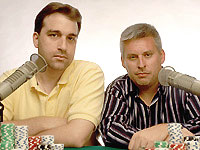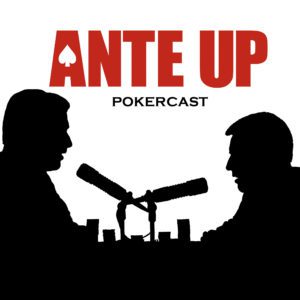In my fantasy, the Grinder and I are heads-up at the final table for the Big One. This epic battle has lasted far too long. The sun has risen and begun to bake the dirty desert horizon as the poker gods finally offer me the kill shot. Grinder seems interested in the flop and unaware that my two-gapper hit a well-disguised straight. All of the money goes in and just like that, it’s over. Groans arise from legions of Grinder supporters while cheers erupt from my tiny band of railbirds consisting of my mom and my two publishers. I am, of course, wearing an Ante Up logo patch.
The reality, of course, is any member of Grinder’s family, including dear sweet Mama Grinder, could probably slap me silly on the poker table and, anyway, I’m too old and set in my ways to stay up playing poker till dawn. All the caffeine, Provigil and Adderall in Nevada couldn’t keep me focused later than a Leno monologue.
This wasn’t always true for me. As a 30-year emergency medicine veteran, I’ve earned a gray hair for every night shift I’ve worked. Thankfully, I don’t work many nights now, but it used to be a brutal necessity for me to stay focused at 5 a.m. when heart attacks rolled in.
Many poker players fight the clock in the very same way. Tournaments drag on too long; the cash game is too good to leave; just a few thousand more online hands and you’ll be a PokerStars Supernova. So you push yourself to stay alert just a few hours longer, trying to focus.
It turns out ignoring your body’s natural sleep cycle is amazingly unhealthy. There are some alarming new studies out that are changing the way ER groups schedule their docs and should make you think twice about those late-night poker sessions.
Hormones that keep us alert fluctuate in a cycle of about 24 hours. When they peak, you find it easy to stay alert. You calculate pot odds easily and notice your opponents’ subtle betting patterns. When these hormones plummet, so do you. Just staying awake is a challenge. Playing poker well is nearly impossible.
I notice my alertness peak at about 10-11 a.m. and my deepest trough occurs very predictably at 5 a.m. I can feel my body temperature and blood sugar plummet and I have to fight to stay awake. By 6:15 I’m beginning to recover and by 7 I’m ready to drive home. Your timing may vary a few hours.
If on rare occasions, say once or twice a month, you ignore your sleep cycle and force yourself to stay awake and focused all night long, you probably don’t do too much damage to your body. Also, if you completely switch your cycle around so that you stay up every night and sleep every day, you body can adapt in about four or five days. The real problem comes from changing your cycle back and forth. If you spend three or four days sleeping all day and playing sessions all night and then switch back to “normal” time for a few days and then back again, that’s when the trouble starts.
There’s good evidence now that switching your sleep cycle back and forth has deleterious effects on cholesterol, insulin, testosterone and a host of other hormones that can lead to an increased risk for diabetes, hypertension, obesity, depression and heart disease. One study suggests those who frequently switch may increase their risk of heart disease by as much as 40 percent. Forty percent! That’s almost as much as smoking a pack a day.
So, here are a few tricks to get in some late-night sessions without killing yourself. First, if you can anticipate an upcoming series of late-night sessions, switch your body over to nights gradually by staying up later and later each night and sleeping later and later each day. That’s called a “clockwise” rotation.
Second, don’t switch back and forth. Sleeping every day during this time is a must. Sleep in a room that’s cool, quiet and dark. Turn off the phone and put a sign on the doorbell. Make sure your family and friends understand and respect your sleep time.
When you’re nearing the last four hours of your late-night session, avoid caffeine completely. Instead, a high-protein snack will give you some temporary energy that will wear off quicker than caffeine. Before bed, a few complex carbs will help you get warm and sleepy. When you awaken, have proteins again and expose yourself to bright lights. Eat healthy foods. Drink plenty of water and be sure to exercise. Don’t use drugs to stay awake or fall asleep.
Pay close attention to your sleep cycles. Notice what time, during an all-night session, you find it most difficult to stay awake. That’s your “anchor sleep” time, the most important time for you to be tucked in bed. If possible, don’t force yourself to stay awake while your hormones are plunging. If you must work or play through your anchor sleep time, try to take a break, close your eyes, rest your brain or even nap for 20-30 minutes until your hormones start waking you up again.
Once you’ve been through a change in your sleep cycle, allow your body about a week to recover and switch back to normal time. In my view, one of the best reasons for delaying the final table of the WSOP Main Event is to allow the players to recuperate from weeks of grueling late night poker in July so they can play their best in November.
Grinder, I may not be sitting across the table from you in November, but I’ll be watching closely. Get plenty of sleep. I expect to see some awesome poker.
— An avid poker player, Frank Toscano, M.D. is a board-certified emergency physician with more than 28 years of front-line experience.He’s medicaldirector for Red Bamboo Medi Spa in Clearwater, Fla. Email your poker-healthquestions to ftosca





